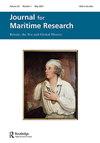Oceanic histories
Q3 Arts and Humanities
引用次数: 13
Abstract
About 70% of the earth’s surface is covered by water and only the remaining 30% of it is dry land. In spite of this, even in recent times, attempts to describe human events in a global and deep historical perspective have had the hard and walkable surface of the world as a privileged object, or at least as a favoured framework. Oceanic Histories represents the first attempt ever made in contemporary historiography to counterbalance this intellectual bias with a comprehensive global history focused on the earth’s waters. The book’s structure is made of chapters dealing with the main seas, and all the oceans covering the earth. In this review I will not expand on the contents of each chapter to end up with a simple descriptive summary, but I shall leave to the reader the pleasure of discovering the historical peculiarities of each sea and ocean. What is more interesting, faced with such a significant book, is to understand what kind of historiographic operation we are facing, and how Oceanic Histories dialogues with contemporary academic debate. It is not surprising, in this sense, that the editors of the book come from important universities located at the antipodes of the world, all overlooking, or at least close to the seas that are described in Oceanic Histories, and in countries that played a leading role in the history of the oceans. In order to understand the book, it is also worth noting the different and complementary academic interests of the editors. David Armitage (Harvard University) is a political historian dealing with global circulation of ideas, with a particular focus on the Atlantic area and the role played by England and海洋的历史
大约70%的地球表面被水覆盖,只有剩下的30%是干燥的土地。尽管如此,即使在最近,试图从全球和深刻的历史角度来描述人类事件的尝试,已经将世界的坚硬和可行走的表面作为一个特权对象,或者至少作为一个受欢迎的框架。《海洋史》是当代史学中第一次尝试用以地球水域为中心的综合性全球史来平衡这种知识偏见。这本书的结构是由涉及主要海洋和覆盖地球的所有海洋的章节组成的。在这篇综述中,我不会对每一章的内容进行扩展,以一个简单的描述性总结结束,但我将留给读者去发现每一个海洋的历史特点的乐趣。更有趣的是,面对如此重要的一本书,我们要了解我们面临的是一种什么样的史学操作,以及《大洋史》如何与当代学术辩论对话。从这个意义上说,这本书的编辑来自世界两端的重要大学并不奇怪,这些大学都俯瞰着《海洋史》中所描述的海洋,或者至少靠近海洋,并且来自在海洋历史上发挥主导作用的国家。为了理解这本书,也值得注意的是,编辑的不同和互补的学术兴趣。大卫·阿米蒂奇(哈佛大学)是一位政治历史学家,研究思想的全球传播,特别关注大西洋地区和英国在其中所扮演的角色
本文章由计算机程序翻译,如有差异,请以英文原文为准。
求助全文
约1分钟内获得全文
求助全文
来源期刊

Journal for Maritime Research
Arts and Humanities-History
自引率
0.00%
发文量
0
期刊介绍:
The Journal for Maritime Research ( JMR ), established by the National Maritime Museum in 1999, focuses on historical enquiry at the intersections of maritime, British and global history. It champions a wide spectrum of innovative research on the maritime past. While the Journal has a particular focus on the British experience, it positions this within broad oceanic and international contexts, encouraging comparative perspectives and interdisciplinary approaches. The journal publishes research essays and reviews around 15-20 new books each year across a broad spectrum of maritime history. All research articles published in this journal undergo rigorous peer review, involving initial editor screening and independent assessment, normally by two anonymous referees.
 求助内容:
求助内容: 应助结果提醒方式:
应助结果提醒方式:


